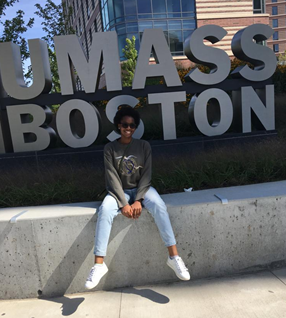A few weeks ago, I had the pleasure of talking to UMass Boston sophomore Ehimen Naomi Adeboyoung about her life growing up in Nigeria, and then moving to Massachusetts for college.
Mass Media: The first thing I wanted to ask is about your background: where you’re from, where you grew up, and what that was like.
Adeboyoung: Well, it will be nice to destroy some stereotypes. I grew up in Lagos, Nigeria. Mostly anyone who is anyone who is from Nigeria is usually from Lagos. Lagos is the unofficial capital of Nigeria, it’s like the commercial capital. Everything happens in Lagos: most parties, occasions, comedy like stand-up. I was actually born in Texas, but I grew up in Lagos. First of all, I don’t have a poor background (laughs), so let me start there. We were… middle class. Most people who have the money there would usually live in what you guys call the “gated communities”. We don’t really have neighborhoods, just “gated communities”. We call them estates. The estate that I lived in―every house looked the same, so that was amazing (laughs).
Growing up… you could call me a daddy’s girl. My dad is the type of person who gives money to his kids. He’s a wonderful dad when it comes to giving us treats. I grew up with two older sisters, and I live with one of them now (in Massachusetts).
MM: What did you do for fun as a kid?
A: I was that shy kid of the group. I always just went with the flow. I remember this one thing… the girls would have “the girls castle” and the boys would have “the boys castle”. If the boys tried to come to our spot, we could chase them out. I never cared if they came, I thought “it’s a free world”.
One thing we would do was bike races. You had to know how to ride a bike. It’s really, really fun. The bike races were never planned. We would just have our bikes and one kid would say “hey, let’s race,” and we’d all be like “YEAH!”.
MM: As someone who grew up in Nigeria, how do you feel in a classroom of people who have lived in America for the majority of their lives?
A: I wasn’t really aware of my race until I came here. In Nigeria, everyone around me was black. If they’re not black… Non-Nigerians in Nigeria are usually Lebanese or Indian. However, sometimes you would see that one white kid in school- usually in richer schools. Coming here was like switching into their shoes. I’m used to culture shock, I used to travel a lot. However, I’m not used to staying in another country. Living here feels like one long summer.
My number one issue here is code-switching. It’s constant, it kind of drains my battery a little bit. At first, when I meet a new person who’s not West-African, I tend to code-switch. As I become closer to a new person, my code-switching reduces gradually, gradually, gradually… I’ve asked my friends if they noticed this. I like when they notice. Code-switching is an issue. Even right now, talking to you, I’m code-switching. No one should code-switch, but the reason people do is… some people act like you’re not speaking English if you have an accent. In the U.S., you kind of have to edit yourself to fit in.
Growing up in Nigeria, it was a compliment when someone said, “you sound like an American”. I kind of sounded like one sometimes, I grew up watching Western television. Everyone, everywhere watches Western television―Cartoon Network! Add that to the interview!
Here, people have a lot of misconceptions about how I grew up. I was so confused about the questions my sister and I would get. Then I saw the way Africa in general is portrayed in the media. I don’t call myself African, I call myself Nigerian. There are something like 54 African countries.
MM: What are your passions?
A: I’m really passionate about the world of animation. In that world, whatever you say, goes. You’re literally creating everything. I like how there are so many ways to express yourself.
MM: This is a great segue to the final question… What is your definition of art?
A: Art is something that can’t be easily defined. It’s not something you can look at and immediately understand. I took an Arts History course my first semester here. I remember looking at the artworks and thinking “if I wasn’t taking this class and learning about this art… I would think this looks like garbage!” Now I know about Dadaism… it’s supposed to be ridiculous. Art is always creative. With art, you start with nothing and create something out of it.





















































